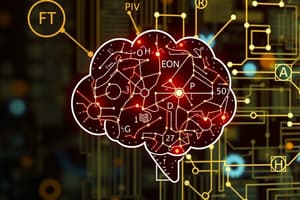Podcast
Questions and Answers
What is the process called when an algorithm requires certain steps to be repeated?
What is the process called when an algorithm requires certain steps to be repeated?
- Iteration (correct)
- Conditioning
- Selection
- Compilation
Which programming construct is typically used for making decisions?
Which programming construct is typically used for making decisions?
- FOR statement
- IF statement (correct)
- CASE statement
- WHILE statement
What helps to avoid long and repetitive code in programming?
What helps to avoid long and repetitive code in programming?
- Debugging
- Procedures and functions (correct)
- Comments
- Variables
How are conditions formed to test in programming?
How are conditions formed to test in programming?
What do computers use to process data?
What do computers use to process data?
What is the fetch-execute cycle associated with?
What is the fetch-execute cycle associated with?
Which type of network is typically associated with a limited geographic area?
Which type of network is typically associated with a limited geographic area?
What should be prioritized when searching for information on the internet?
What should be prioritized when searching for information on the internet?
What allows users to filter through the vast information available on the internet?
What allows users to filter through the vast information available on the internet?
Which is a benefit of understanding computer-related laws?
Which is a benefit of understanding computer-related laws?
What is the main purpose of decomposition in computational thinking?
What is the main purpose of decomposition in computational thinking?
How does recognizing patterns in problems assist in computational thinking?
How does recognizing patterns in problems assist in computational thinking?
What does abstraction involve in the context of computational thinking?
What does abstraction involve in the context of computational thinking?
What are algorithms primarily used for?
What are algorithms primarily used for?
What is essential to ensure when designing an algorithm?
What is essential to ensure when designing an algorithm?
Which of the following methods can be used to represent an algorithm?
Which of the following methods can be used to represent an algorithm?
Which of the following best defines the term 'evaluation' in algorithm design?
Which of the following best defines the term 'evaluation' in algorithm design?
What is the purpose of searching algorithms like binary search?
What is the purpose of searching algorithms like binary search?
Which sorting algorithm is characterized by repeatedly stepping through the list to be sorted?
Which sorting algorithm is characterized by repeatedly stepping through the list to be sorted?
What is the role of decision-making in algorithm design?
What is the role of decision-making in algorithm design?
Flashcards
Decomposition
Decomposition
Breaking down a complex problem or system into smaller, more manageable parts.
Patterns
Patterns
Identifying recurring elements or characteristics that help solve problems efficiently.
Abstraction
Abstraction
Focusing on essential features while ignoring unnecessary details to simplify a problem.
Algorithm
Algorithm
Signup and view all the flashcards
Evaluation
Evaluation
Signup and view all the flashcards
Pseudocode
Pseudocode
Signup and view all the flashcards
Flowcharts
Flowcharts
Signup and view all the flashcards
Sorting Algorithms
Sorting Algorithms
Signup and view all the flashcards
Sequencing
Sequencing
Signup and view all the flashcards
Selection
Selection
Signup and view all the flashcards
Iteration
Iteration
Signup and view all the flashcards
Logical Reasoning
Logical Reasoning
Signup and view all the flashcards
Programming
Programming
Signup and view all the flashcards
IF Statements
IF Statements
Signup and view all the flashcards
FOR/WHILE Statements
FOR/WHILE Statements
Signup and view all the flashcards
Boolean Logic
Boolean Logic
Signup and view all the flashcards
Arrays and Lists
Arrays and Lists
Signup and view all the flashcards
Procedures and Functions
Procedures and Functions
Signup and view all the flashcards
Debugging
Debugging
Signup and view all the flashcards
Documenting
Documenting
Signup and view all the flashcards
Study Notes
Computational Thinking
- Computational thinking helps to understand a problem and find ways to resolve it
- Decomposition breaks down complex problems into manageable parts
- Patterns in problems help solve them more efficiently
- Abstraction gathers general characteristics and filters out unnecessary details
- An algorithm is a plan with step-by-step instructions to resolve a problem
- Evaluation ensures a solution satisfies the problem efficiently
Designing Algorithms
- Understanding the problem is essential before designing an algorithm
- Pseudocode and flowcharts can be used to design algorithms
- Searching algorithms (serial search, binary search) make searching for data easier
- Sorting algorithms (bubble sort, bucket sort) help put data in order
- Sequencing presents steps in the correct order
- Selection makes decisions in algorithms
- Iteration repeats steps in algorithms
- Logical reasoning predicts algorithm outcomes to select the best solution
Introduction to Programming
- Programming writes computer code to solve a problem
- Programs consist of a series of instructions to tell a computer what to do
- Selection in programming uses IF statements
- Iteration in programming uses FOR and WHILE statements
- Conditions are formed using Boolean logic
- Arrays and lists simplify programs by storing related data
- Procedures and functions keep code simple and short
- Debugging removes errors, and documenting keeps code clear
Data Representation
- Computers use binary to process data
- Techniques exist to convert between binary and denary, and add binary numbers
- Text, images, and sound are converted into binary for processing
- Images and sound are compressed to create smaller files
Digital Devices and Software
- Digital devices may be input, output, or storage devices
- Devices operate through the use of logic gates
- Software is the programs run on computer hardware
- There are two types of software: systems software and applications software
The CPU and Fetch-Execute Cycle
- The central processing unit (CPU) has three main components
- Factors influence the CPU's speed
- The fetch-execute cycle is the process the CPU uses
Introduction to Networks
- Wide area networks and local area networks are the two main types of networks
- Networks have benefits and problems
Internet and Communication
- The internet allows communication and sharing of information
- Search engines help filter through internet pages
- Online dangers can largely be avoided with simple precautions
Bias and Reliability
- Finding reliable and unbiased information is crucial
- The internet requires critical evaluation of information
The Law and Ethics
- Computer-related laws exist to protect users
- Awareness of laws helps stay safe online
Jobs that use Computer Science
- Many jobs use computer science skills and knowledge
Studying That Suits You
Use AI to generate personalized quizzes and flashcards to suit your learning preferences.




